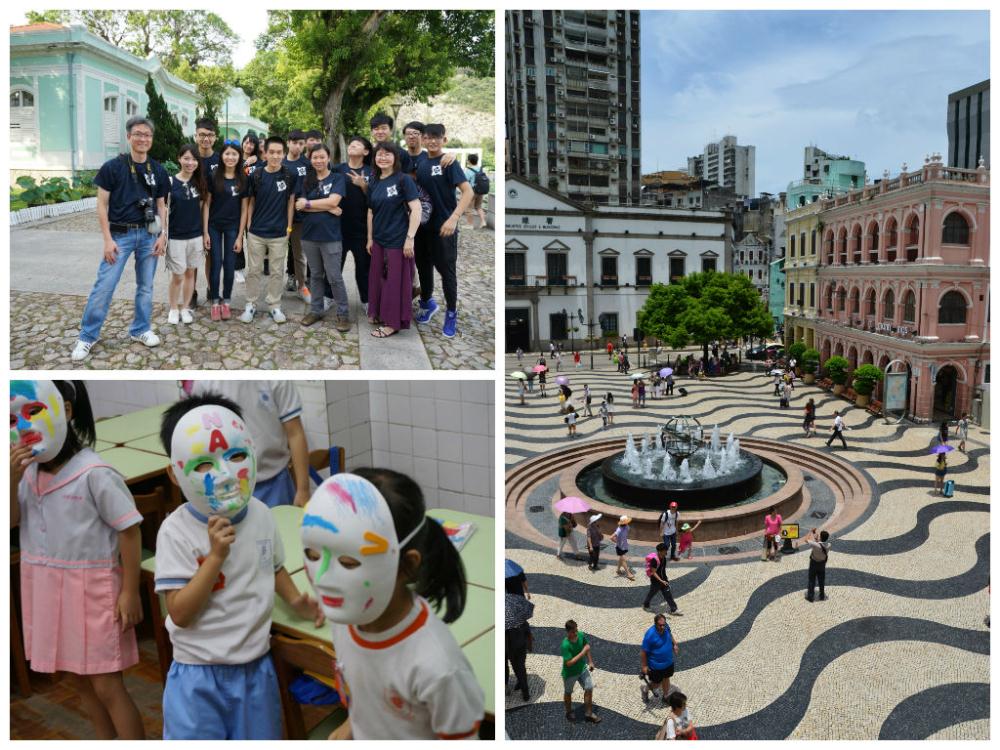Footprints on the Forking Road

The first 7-11 convenience store in Macau appeared in 2005. Macau gaming revenues have been soaring ever since the opening of the gambling franchise in 2002. Gambling has changed the lifestyle of Macanese and given birth to the mushrooming of 24-hour convenience stores. With guidance from 8 SHHO students, 16 junior secondary students came to Macau under the scorching July sun to organize activities for the target groups in two social welfare organizations. They worked as team players in the service projects, and learnt from YMCA and Macao Polytechnic Institute about how gambling changes the urban life.
In the eighties and nighties, Macanese mainly shopped in grocery stores as there was not any convenience store. The opening of the gambling franchise in Macau, accelerated by the ‘Individual Visit Scheme’ the mainland government initiated, caused the gaming revenues in 2007 surpassed those in Las Vegas strip. Till 2014, the 7-11 convenience stores have increased to more than 45. Gambling has accelerated the economic growth in Macau. It also brings unprecedented changes to Macau’s socio-cultural landscape: more and more local stores are replaced by overseas brands like Taiwanese drink shops, American fast food chains and European cosmetics shops. Half of Macanese workforce is related to gambling industry. 90% of the junior secondary participants came to Macau for the first time. Together with the SHHO mentors, they visited tourist spots like Macao Museum and the Ruins of St. Paul’s to deepen their understanding on the culture and development of Macau.
In addition to site visits, the junior secondary participants served in the Dawn Centre of the Macau Association of Parents of Mentally Handicapped and Macau Caritas Kindergarten respectively. The young volunteers actively participated in the whole process: selecting and understanding the service recipients, learning to organize events, preparing for event resources, arranging logistics and drafting MC scripts. They found their involvement incredible as they mainly took up the role of distributing gifts in voluntary events they previously attended. S.H Ho College teachers and student mentors would only provide with the young volunteers pre-event training on self-understanding, communicating with people from different age groups, event organization skills, understanding the target group and proper attitude on serving the needy.
Volunteers from Pok Oi Hospital Chan Kai Memorial College served some moderate to severe mentally handicapped adults. They planned to play a game ‘Teacher says…’ which requires the participants to follow verbal instructions with body posture. Having realised the target group could not identify direction and colours, the volunteers immediately simplified their instructions and requirements. The contingency decision revealed the volunteers’ responsiveness to spontaneous changes. With plenty of preparation beforehand, the emcees also instructed the audience with proper tempo and encouraged them throughout the session which aroused a joyous atmosphere among the participants. Voluntary work is a bilateral experience. Those young volunteers do not have brilliant performance at school and tend to feel being neglected. Despite the challenges faced by the mentally handicapped adults every day, they just face them with optimism and candour upright. The volunteers were inspired: Happiness can be simple. Seeing the event ended smoothly, the young volunteers were satisfied and their confidence boosted.
Grooming young service leaders takes time and efforts. Event organizing skills, mutual trust and synergy in collaboration are gradually accumulated over the yearlong programme. SHHO student Joanne Lee recalled her memory on the initial collaboration with the young volunteers in planning for activities to be held in Precious Blood Children’s Village. The volunteers were not too well prepared and hereby the workload was mostly shared among the SHHO students. The volunteers also appeared to be a bit disorganized in the event. Having reflected upon the experience, they learnt the importance of preparation and became serious in preparing for the Macau community service project and demonstrated teamwork in the event. Their performance might not be very brilliant, but the progress and serious attitude demonstrated prevail over the result.
‘To influence life with life’ is the core of the yearlong S.H. Ho College Student Social Service Mentorship Programme in which SHHO students mentor junior secondary students and scaffold them with event organization skills. Through organizing local and overseas community services, the student mentors will develop coaching skills through mentoring the teenagers while the secondary school participants can develop a sense of self efficacy, improve communication and interpersonal skills. Student mentor Silvia Mok admitted that she could not bear the bittersweet moment of having the fraternity and the yearlong programme come to an end. I’ve learnt a lot from the voluntary services, and interacting with the junior secondary participants and among the student mentors. I’m thankful to those who have devoted a lot to the programme.’
Macanese are facing the forking road in times of contemplating on the future of the sociocultural change in the city brought by the skyrocketing economic development. The secondary school participants are also on the forking road in their growth. They need someone who experience the process with them, offering encouragement and guidance all along. S.H. Ho College Student Social Service Mentorship Programme will continue to inspire generations, and pen the stories of ‘influencing life with life’.


